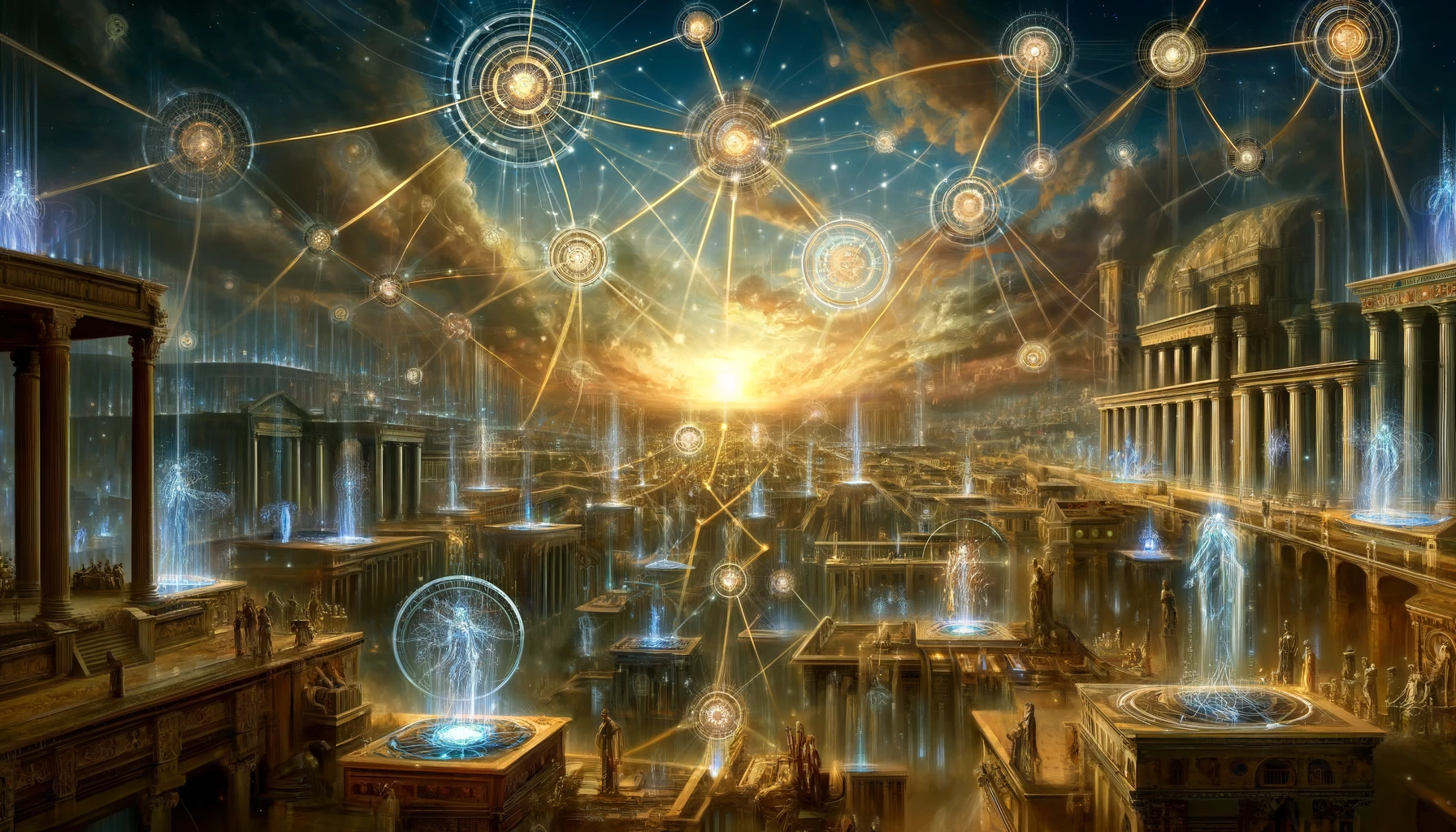Content
- Benefits of Decentralized AI
- Enhanced Security and Privacy
- Increased Transparency and Trust
- Democratized AI Development
- Resilience and Fault Tolerance
- Incentivized Participation
- Challenges of Decentralized AI
- Complexity and Learning Curve
- Scalability Issues
- Regulatory and Legal Concerns
- Trust and Consensus Mechanisms
- Limited Adoption and Maturity
- Conclusion
- Frequently Asked Questions (FAQs)
- 1. What is decentralized AI?
- 2. How does decentralized AI improve security?
- 3. What are the main challenges of decentralized AI?
- 4. How does decentralized AI democratize AI development?
- 5. What is the future potential of decentralized AI?
- About Zerocap
- DISCLAIMER
30 May, 24
Decentralized AI: Pros and Cons

- Benefits of Decentralized AI
- Enhanced Security and Privacy
- Increased Transparency and Trust
- Democratized AI Development
- Resilience and Fault Tolerance
- Incentivized Participation
- Challenges of Decentralized AI
- Complexity and Learning Curve
- Scalability Issues
- Regulatory and Legal Concerns
- Trust and Consensus Mechanisms
- Limited Adoption and Maturity
- Conclusion
- Frequently Asked Questions (FAQs)
- 1. What is decentralized AI?
- 2. How does decentralized AI improve security?
- 3. What are the main challenges of decentralized AI?
- 4. How does decentralized AI democratize AI development?
- 5. What is the future potential of decentralized AI?
- About Zerocap
- DISCLAIMER
Artificial Intelligence (AI) has seen tremendous growth over the past decade, influencing various sectors and transforming how businesses and services operate. However, traditional AI development has been largely centralized, controlled by major corporations with significant resources. Recently, the concept of decentralized AI has emerged as a promising alternative. In this article, we will explore the pros and cons of decentralized AI, with the keyword focus on “decentralized AI.”


Decentralized AI refers to the development and deployment of artificial intelligence systems in a decentralized manner, often using blockchain technology. Unlike traditional centralized AI, which is controlled by a single entity, decentralized AI distributes the processing, storage, and decision-making across multiple nodes in a network. This approach aims to democratize AI, making it more accessible, transparent, and secure. Decentralized AI can leverage technologies such as blockchain, federated learning, and decentralized cloud computing to achieve its goals.
Benefits of Decentralized AI
Enhanced Security and Privacy
One of the primary benefits of decentralized AI is improved security and privacy. Traditional AI systems often require users to share their data with a central authority, posing significant privacy risks. Decentralized Artificial Intelligence, on the other hand, allows users to retain control over their data. By processing data locally and only sharing the necessary insights, decentralized AI minimizes the risk of data breaches and unauthorized access (Cointelegraph) (Techopedia).
Increased Transparency and Trust
Decentralized AI promotes transparency by recording all transactions and decision-making processes on a blockchain. This immutable ledger ensures that every action taken by the AI can be traced and verified, enhancing accountability. Such transparency is crucial in building trust with users, who can see how their data is used and how decisions are made (Cointelegraph) (coin bureau).
Democratized AI Development
Decentralized AI enables independent researchers and smaller organizations to participate in AI development. By moving away from centralized control, it opens up opportunities for a wider range of contributors, fostering innovation and diversity in AI research. This democratization can lead to more varied and inclusive AI models, addressing a broader spectrum of needs and use cases (Techopedia) (Distributed Ledger Tech Magazine).
Resilience and Fault Tolerance
In a decentralized AI network, tasks and data are distributed across multiple nodes. This architecture reduces the risk of a single point of failure, making the system more resilient to attacks and technical issues. If one node fails or is compromised, others can continue to operate, ensuring the overall stability and reliability of the AI system (coin bureau) (Distributed Ledger Tech Magazine).
Incentivized Participation
Decentralized AI networks often use incentive mechanisms to encourage participation. For example, platforms like Bittensor reward contributors with cryptocurrency tokens based on the value they add to the network. This incentivizes high-quality contributions and fosters a competitive environment that drives continuous improvement in AI capabilities (coin bureau).
Challenges of Decentralized AI
Complexity and Learning Curve
Adopting decentralized AI requires understanding new protocols, frameworks, and technologies, which can be challenging for businesses and individuals. The complexity of managing a decentralized system, including synchronizing data across nodes and maintaining the network, requires specialized expertise. This steep learning curve can be a barrier to widespread adoption (Distributed Ledger Tech Magazine).
Scalability Issues
While decentralized AI offers many benefits, it also faces scalability challenges. The need to distribute data and processing across multiple nodes can lead to latency and performance issues, especially as the network grows. Ensuring efficient communication and coordination among nodes is crucial to maintaining the system’s performance and scalability (Cointelegraph) (coin bureau).
Regulatory and Legal Concerns
Decentralized AI operates in a relatively new and evolving regulatory landscape. Issues related to data privacy, intellectual property, and liability are complex and not yet fully addressed by existing laws. Navigating these regulatory challenges requires careful consideration and may slow down the adoption and development of decentralized AI systems (BeInCrypto) (Distributed Ledger Tech Magazine).
Trust and Consensus Mechanisms
Maintaining trust and achieving consensus in a decentralized AI network is challenging. Ensuring that all nodes operate honestly and preventing malicious activities requires robust consensus mechanisms. Implementing such mechanisms can be complex and resource-intensive, potentially limiting the efficiency and effectiveness of the system (coin bureau).
Limited Adoption and Maturity
Decentralized AI is still in its infancy, with limited real-world applications and adoption compared to centralized AI. While promising, many decentralized AI projects are experimental and have yet to prove their viability at scale. This limited adoption can deter businesses from investing in decentralized AI solutions, preferring more established centralized alternatives (Techopedia) (Distributed Ledger Tech Magazine).
Conclusion
Decentralized AI presents a compelling vision for the future of artificial intelligence, offering enhanced security, transparency, and democratization of AI development. However, it also faces significant challenges, including complexity, scalability, and regulatory hurdles. As technology evolves and more real-world applications emerge, decentralized AI has the potential to transform the AI landscape, making it more inclusive and resilient.
Frequently Asked Questions (FAQs)
1. What is decentralized AI?
Decentralized AI refers to the development and deployment of AI systems in a distributed manner, using technologies like blockchain to ensure security, transparency, and democratized control.
2. How does decentralized AI improve security?
By processing data locally and leveraging blockchain for secure transactions, decentralized AI minimizes the risk of data breaches and unauthorized access.
3. What are the main challenges of decentralized AI?
Key challenges include complexity, scalability issues, regulatory concerns, and maintaining trust and consensus within the network.
4. How does decentralized AI democratize AI development?
Decentralized AI enables independent researchers and smaller organizations to contribute to AI development, fostering innovation and diversity in AI research.
5. What is the future potential of decentralized AI?
While still in its early stages, decentralized AI has the potential to transform the AI landscape by making it more secure, transparent, and inclusive, although it must overcome significant challenges to achieve widespread adoption.
About Zerocap
Zerocap provides digital asset liquidity and digital asset custodial services to forward-thinking investors and institutions globally. For frictionless access to digital assets with industry-leading security, contact our team at [email protected] or visit our website www.zerocap.com
DISCLAIMER
This material is issued by Zerocap Pty Ltd (Zerocap), a Corporate Authorised Representative (CAR: 001289130) of AFSL 340799. Material covering regulated financial products is issued to you on the basis that you qualify as a “Wholesale Investor” for the purposes of Sections 761GA and 708(10) of the Corporations Act 2001 (Cth) (Sophisticated/Wholesale Client). This material is intended solely for the information of the particular person to whom it was provided by Zerocap and should not be relied upon by any other person. The information contained in this material is general in nature and does not constitute advice, take into account the financial objectives or situation of an investor; nor a recommendation to deal. Any recipients of this material acknowledge and agree that they must conduct and have conducted their own due diligence investigation and have not relied upon any representations of Zerocap, its officers, employees, representatives or associates. Zerocap has not independently verified the information contained in this material. Zerocap assumes no responsibility for updating any information, views or opinions contained in this material or for correcting any error or omission which may become apparent after the material has been issued. Zerocap does not give any warranty as to the accuracy, reliability or completeness of advice or information which is contained in this material. Except insofar as liability under any statute cannot be excluded, Zerocap and its officers, employees, representatives or associates do not accept any liability (whether arising in contract, in tort or negligence or otherwise) for any error or omission in this material or for any resulting loss or damage (whether direct, indirect, consequential or otherwise) suffered by the recipient of this material or any other person. This is a private communication and was not intended for public circulation or publication or for the use of any third party. This material must not be distributed or released in the United States. It may only be provided to persons who are outside the United States and are not acting for the account or benefit of, “US Persons” in connection with transactions that would be “offshore transactions” (as such terms are defined in Regulation S under the U.S. Securities Act of 1933, as amended (the “Securities Act”)). This material does not, and is not intended to, constitute an offer or invitation in the United States, or in any other place or jurisdiction in which, or to any person to whom, it would not be lawful to make such an offer or invitation. If you are not the intended recipient of this material, please notify Zerocap immediately and destroy all copies of this material, whether held in electronic or printed form or otherwise.
Disclosure of Interest: Zerocap, its officers, employees, representatives and associates within the meaning of Chapter 7 of the Corporations Act may receive commissions and management fees from transactions involving securities referred to in this material (which its representatives may directly share) and may from time to time hold interests in the assets referred to in this material. Investors should consider this material as only a single factor in making their investment decision.
Like this article? Share
Latest Insights
Interview with Ausbiz: How Trump’s Potential Presidency Could Shape the Crypto Market
Read more in a recent interview with Jon de Wet, CIO of Zerocap, on Ausbiz TV. 23 July 2024: The crypto market has always been
Weekly Crypto Market Wrap, 22nd July 2024
Download the PDF Zerocap is a market-leading digital asset firm, providing trading, liquidity and custody to forward-thinking institutions and investors globally. To learn more, contact
What are Crypto OTC Desks and Why Should I Use One?
Cryptocurrencies have gained massive popularity over the past decade, attracting individual and institutional investors, leading to the emergence of various trading platforms and services, including
Receive Our Insights
Subscribe to receive our publications in newsletter format — the best way to stay informed about crypto asset market trends and topics.



 Share
Share  Tweet
Tweet  Post
Post 